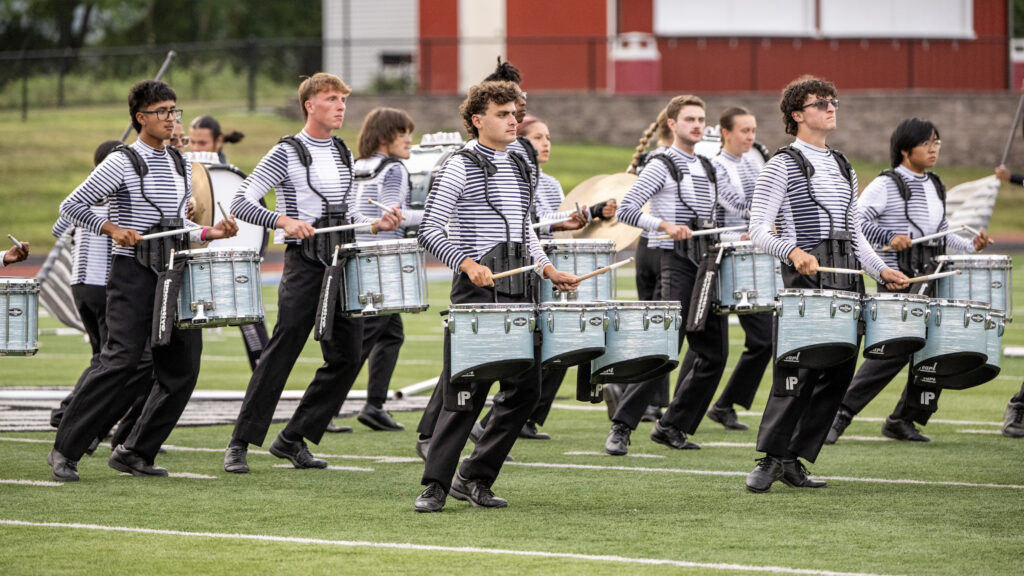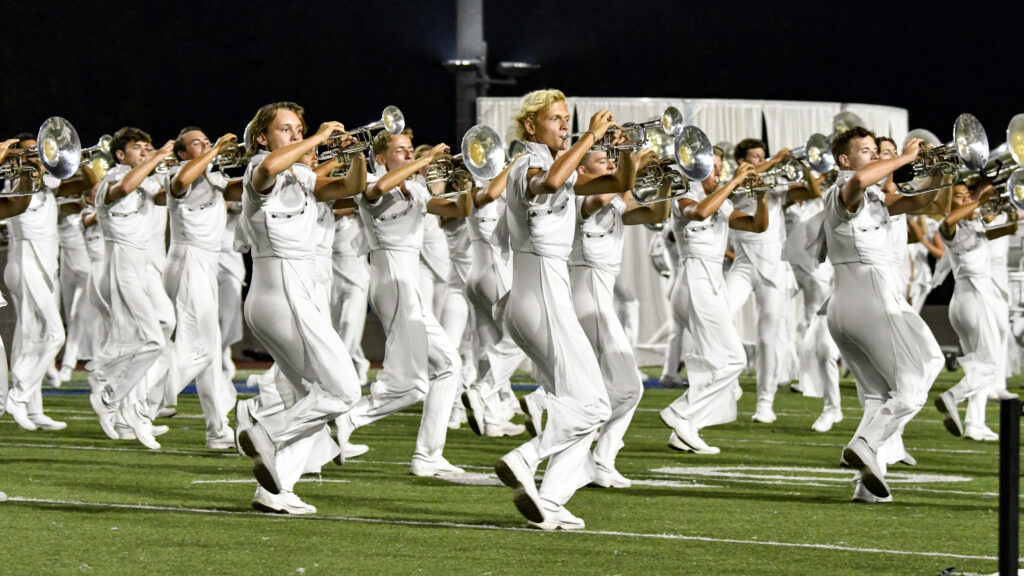Michele Moriggi has lived in Italy his entire life. The marching music activity is largely unknown in the country — there are no drum corps and only one marching band. Fulfilling a dream, Michele (pronounced Mee-KAY-la) is going to be marching with the Cavaliers this year. Here’s his story. So here I am. My name is Michele Moriggi and I’m from Italy. Have you ever heard about Italian drum corps? If the answer is “no,” you are right! We have no drum corps in Italy. I play in the only serious Italian marching band, the Millennium Marching Band (http://www.millenniumband.org) where we are all drum corps addicted. We’ve had a lot of contacts with American drum corps instructors. We’ve hosted color guard instructors Bruno Zuccala (the Cavaliers) in 1999 and Jennifer Leseth (Madison Scouts) in 2004. We brought in 2002 Cavaliers drum majors Brandon Barrometti and Ryan Ling last spring, along with others. We asked them simply to teach us — and they did it very well. We are just working hard to promote drum corps and marching music in Italy, where the activity is completely unknown. I’m writing you because I successfully auditioned on mellophone for the Cavaliers and I will march in 2005. Unfortunately, it will be my first and last year and, as far as I know, I will be the first marcher from Italy in a DCI corps. I thought it might be interesting to read about a guy from a country with no drum corps, ready to make Drum Corps International more international, ready to share feelings and impressions from a “virgin” point of view. So, here I am! The Millennium is trying to help kids in the band join American drum corps, paying their fees if they make it. I will be the first to get this “sponsorship,” and I hope that many others will follow me. You have to know that in Italy, music is not a serious school subject. Don’t ask me why, but here, where Western symphonic music was born, politicians do not believe in music as an educational tool and no one cares about the musical education of children. We study music only during primary and secondary school (from when we are 6 until 14 years old), but like gymnastics, it is a school subject during which kids just enjoy themselves more than anything else. Instrumental music is not a school subject in high school and you also can’t study it at a university. The only way for someone to learn how to play an instrument is to join one of the popular small symphonic bands you can find in almost every little city. These are low quality bands, made of about 20 to 30 people, with missing sections. When I was playing in the band of my city, there where no tubas and no trombones. These bands perform a couple of concerts per year — usually one for Christmas and one during spring — and do parades for civic and religious events. Councils of about 10 people — who don’t care that much about music — usually control the bands. The bands organize short music courses, and just when kids can play a few notes, they are kicked into the band. If they played better, they might challenge the hierarchy of the “senators.” Most bands haven’t changed how they play or the kind of music they play since the 1950s. We lose a lot of good musicians who just can’t stand the system. It is a system where everyone’s musical hopes flourish — and then die in a couple of years. So, if you survive, you can join a conservatory (as I did) and experience another bad way to teach music. Some proud kids go on with their passion by joining a conservatory, the highest level of musical education in Italy. But, if you join a conservatory, you have to play in an orchestra. You shouldn’t go on studying if you don’t want to become a professional performer, as you don’t choose between performing and teaching as you would in America. To become a professional is very hard, because once someone passes the audition for an orchestra, he will play there until he dies, no matter if he will plays poorly. There is little or no room for young players. You might be wondering: Is this a clear picture of the situation of music in Italy? Believe me, it is no musical paradise. The opinion of the teachers is that music is for an elite group of people.
In Italy, all the bands play orchestral transcriptions from the melodramas: Verdi, Donizetti, Rossini — they want to be an orchestra rather than a real band. But they are a band. Actually, some directors are now trying to play “band” music from composers like John Van der Roost, Johan de Meij, etc., but it’s hard to change something that has been the same since these bands were founded, and this “new style” is affecting only bands from northern Italy. I’m still studying French horn in a conservatory, in my fifth year of six. As I mentioned earlier, the Millennium Marching Band is the only serious marching band in Italy, and we carry the drum corps style onto the field. We are drum corps addicts. The Millennium Marching Band has taken part in the World Association for Marching Show Bands (WAMSB) World Championships every year since 2001. Our style seems close to that of the excellent bands we saw from Japan and Thailand at the world championship in Chiba, Japan in 2002. That is likely due to the fact that we all take American drum corps as our point of reference. And when we meet members from those Asian bands, guess what we talk about? American drum corps! But, in Europe, it seems we are alone. I haven’t seen any other marching band like us on the old continent. However, that may change. In 2003, the WAMSB World Championships was held in Monza, a city near Milan that is famous for the speedway that is home to the Formula 1 Italian Grand Prix. The WAMSB event stirred something in the Italian band world. Some directors saw what other bands were doing and were kind of scared. Some likely thought, “You can’t play AND march at the same time.” But others thought, “I want to do that!” As a result of the WAMSB World Championship in Monza, an Italian association was founded, the IMSB (Italia Marching Show Bands). This resulted in the first Italian National Championship for Marching Bands in 2004. As the only current serious marching band in Italy, Millennium won both the drill and parade competition. Some of the Italian symphonic bands tried to “convert” themselves into marching bands, but they are carrying with them their old way of doing things. They taught their members things they don’t know how to teach and some even wrote “technique books,” and … Oh my God, I’m sorry, but this is “the Italian way.” But at least some bands are trying to do something new. The IMSB has asked Millennium to present some clinics and we will start this job early this year. Hopefully, this will help some of the younger Italian marching bands to “grow up.” I’m happy to tell you that a lot of people will attend those clinics. Maybe something is changing.
Michael Boo has been involved with drum and bugle corps since 1975, when he marched his first of three seasons with the Cavaliers.
He has a bachelor’s degree in music education and a master’s degree in music theory and composition.
He has written about the drum corps activity for over a quarter century for publications such as Drum Corps World, and presently is involved in a variety of projects for Drum Corps International, including souvenir program books, CD liner notes, DCI Update and Web articles, and other endeavors. Michael currently writes music for a variety of idioms, is a church handbell and vocal choir director, an assistant director of a community band, and a licensed Realtor in the state of Indiana. His other writing projects are for numerous publications, and he has published an honors-winning book on the history of figure skating. His hobbies include TaeKwonDo and hiking the Indiana Dunes. But more than anything, Michael is proud to love drum corps and to be a part of the activity in some small way, chronicling various facets of each season for the enjoyment of others.





